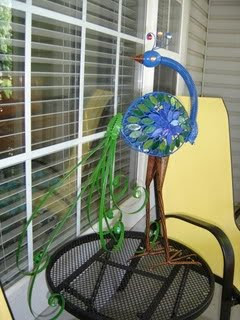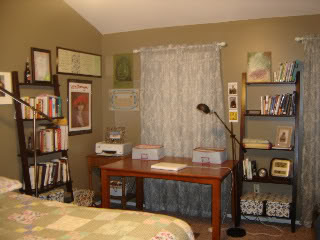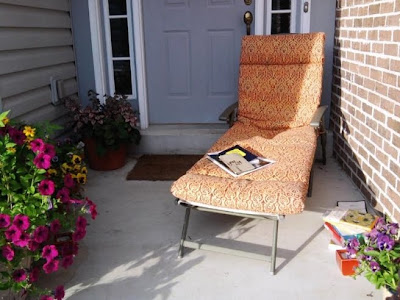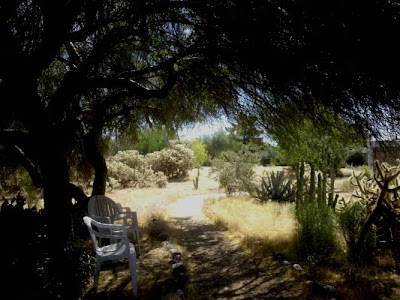Why are there so many good creative writers these days? Having recently read some litmags -- the Spoon River Poetry Review, Rattle, the new issue of Natural Bridge -- and some collections of poetry and nonfiction, I'm awed. Today in the U.S. there is more good writing by more good writers than ever.
One can reply "Leisure," pointing out that a great many people (but not all who want to, not by a long shot) may now pursue what was formerly an elite activity. Along those lines of practical reasons you'd have to include "literacy" and "education" and "freedom of speech."
But, from a spiritual angle, the swell of creative writing is perfectly parallel to the swell of lies and con games invented by those who use life and language and imagination not to enlighten us but to make us smaller, needier, more complacent, and more anxious. Creative writing is a form of resistance. The more lies we are told, the more we are urged to be ignorant -- and that's not natural -- the more we resist. Simple. And, writers: GOOD JOB!!!
Wednesday, June 30, 2010
So Much Good Writing
Labels:
advertising,
better writing,
creativity,
leisure,
making the time to write,
reasons to write,
U.S.A.
Sunday, June 27, 2010
Why I'm Entering Contests Now
A few years back I was terrifically anti-writing-contest. My basic desire is to write well, not to compete.
But times have changed. Publication is no longer the top criterion and recommendation. Today, winning and trumpeting prizes is how one establishes or re-establishes credibility with strangers, editors, and those who hire. Before 2006, my last cash-bearing poetry prize came in 1987; the last for prose in 1994. Nice awards, but literature now is a culture of prizes -- it feels like a blizzard out there, as you well know -- and many good young writers are now in the mix, so that old awards could make me seem like a has-been on resumes or in author bios.
Considering how many prizes there are, and the things that win them, for the best writerly mental health the appellation "award-winning" is best seen as decorative, or, more precisely, cosmetic. One's work can be beautiful without it.
But times have changed. Publication is no longer the top criterion and recommendation. Today, winning and trumpeting prizes is how one establishes or re-establishes credibility with strangers, editors, and those who hire. Before 2006, my last cash-bearing poetry prize came in 1987; the last for prose in 1994. Nice awards, but literature now is a culture of prizes -- it feels like a blizzard out there, as you well know -- and many good young writers are now in the mix, so that old awards could make me seem like a has-been on resumes or in author bios.
Considering how many prizes there are, and the things that win them, for the best writerly mental health the appellation "award-winning" is best seen as decorative, or, more precisely, cosmetic. One's work can be beautiful without it.
Labels:
award,
chapbooks,
competitions,
contest,
farce,
mental health,
poetry contest,
publishing,
writing contests
Saturday, June 26, 2010
The Psychic
It's bad luck to be superstitious, but yesterday I impulsively saw a "reader" -- I didn't know or care what sort --who was on duty at Mystic Valley. I bought a half-hour of a psychic's time. Of course I asked her about writing.
She said I had grown comfortable in my small pond and it no longer fit me, reminded me that my original dream was much grander, and that I should face forward, enlarge my life, move physically if possible, apply for employment out of state or at the very least submit works to publications on the coasts. I said, some of those I can and will do. She said nonfiction was the way for me to go. I said, I can do that.
She did not consult the Tarot deck I saw on the table. I said, Please pull a random card for me. She did, and it was the Queen of Pentacles, a very good card for a mature, ambitious woman. Felt better. And that's how I coped with my questions, fears and doubts that day.
She said I had grown comfortable in my small pond and it no longer fit me, reminded me that my original dream was much grander, and that I should face forward, enlarge my life, move physically if possible, apply for employment out of state or at the very least submit works to publications on the coasts. I said, some of those I can and will do. She said nonfiction was the way for me to go. I said, I can do that.
She did not consult the Tarot deck I saw on the table. I said, Please pull a random card for me. She did, and it was the Queen of Pentacles, a very good card for a mature, ambitious woman. Felt better. And that's how I coped with my questions, fears and doubts that day.
Labels:
doubt,
employment,
luck,
mystic valley,
psychic,
psychology,
superstion,
writers
Thursday, June 24, 2010
Ideal Writing Space: Kim's

 Kim Lozano writes, "When I started writing, I decided that I needed to be able to shut my door against the children (the sweet little darlings) and have a little place of my own. So I cleared out an old chair and table out of my bedroom and moved in a desk and bookshelves. On that upper left-hand shelf, beside the Bud Light bottle with the birthday candle on top, is a framed copy of my first rejection letter. On coolish days, I like to sit on my porch in one of my new, comfy yellow chairs ($25 each at Target) beside my peacock, Flannery."
Kim Lozano writes, "When I started writing, I decided that I needed to be able to shut my door against the children (the sweet little darlings) and have a little place of my own. So I cleared out an old chair and table out of my bedroom and moved in a desk and bookshelves. On that upper left-hand shelf, beside the Bud Light bottle with the birthday candle on top, is a framed copy of my first rejection letter. On coolish days, I like to sit on my porch in one of my new, comfy yellow chairs ($25 each at Target) beside my peacock, Flannery."
Labels:
bible for writers,
ideal writing place,
kim lozano,
making time to write,
office,
privacy,
writing space
Tuesday, June 22, 2010
Talking With: St. Louis Poetry Anthology Editor Matt Freeman
 Mark your calendars: Friday, July 16 at 7 p.m. is the launch party for Floodstage: An Anthology of St. Louis Poets (Walrus Publishing, $18), at Left Bank Books downtown, 321 North 10th Street, St. Louis. Editor and well-known full-time poet Matt Freeman talks about assembling this landmark anthology of 55 area poets -- it took two and a half years:
Mark your calendars: Friday, July 16 at 7 p.m. is the launch party for Floodstage: An Anthology of St. Louis Poets (Walrus Publishing, $18), at Left Bank Books downtown, 321 North 10th Street, St. Louis. Editor and well-known full-time poet Matt Freeman talks about assembling this landmark anthology of 55 area poets -- it took two and a half years:Who came up with the idea of this anthology, and how did you become its editor?
Even before I knew very many St. Louis poets, I thought an anthology might be a really neat thing to do for the city. I was lucky to meet Lisa Miller at a friend's workshop, and she mentioned she had just started a new publishing house. I pitched her the idea and we were underway.
What was the best moment while you put this anthology together?
Trite though it is, my best moment during this project came only recently when Lisa emailed me the cover of the book. I had a strange sensation of pride. And I'm still astonished that it came together.
What was the toughest thing about this project?
The toughest thing has been that since completing the editing, I've met so many wonderful poets who really should've been included. I'm sorry for that.
What were the criteria for the poets you included?
I decided to select the group of poets from all the acquaintances I've made hitting the scene pretty hard for a couple of years. The criteria only came into play as I selected the poems for inclusion, and got to come forth with my own voice. I am sorry that a few poets out there seemed to resist sending me some poems!
Why should people buy this anthology?
Anyone interested in St. Louis culture and anyone who has a lot of pride in our city ought to consider buying the book. Maybe parents of budding poets; maybe the poets for whom this is their first publication ought to tell friends about it, maybe social workers; maybe avant-garde painters too.
Anything else you want to add?
I've just had a good time here in St Louis. I'm glad for all my brilliant friends. I've been delivered and surprised in a variety of fashions.
Labels:
book publishing,
editor,
flood stage,
floodstage,
lisa miller,
matt freeman,
poetry,
publishing poetry,
st louis anthology,
St. Louis,
walrus publishing
Sunday, June 20, 2010
Give and Take with an Editor
Kansas City Voices, an annual, last week chose a poem of mine for its 2010 edition, but the judge (his assistant called him "the poetry editor of the Kansas City Star") had suggested some changes in it. Open to suggestions? I always am; that's the nature of our business; plus, I had submitted that work in March and have since revised it, so I knew it needed revision. The assistant e-mailed me the judge's version of the poem. Golly.
Knowing that editors are not writers' enemies but their best friends, I gave the suggestions their due. About half of them would not harm the poem; about a quarter of them would help.
I printed out "their" preferred version and came up with my "corrected corrected" version. Naturally they were on deadline, so the assistant and I then worked by phone to reach a meeting of minds. I had cut out an image she liked. I explained how it was "over the top," and she suddenly saw that and agreed. I had deleted another line she said she hated to lose, so I let it back in. This mutual tweaking took about twenty minutes.
The result: The poem is better than when I sent it, and we are now both satisfied. How did that happen? Respectful. Calm. Informed. Orderly.
Knowing that editors are not writers' enemies but their best friends, I gave the suggestions their due. About half of them would not harm the poem; about a quarter of them would help.
I printed out "their" preferred version and came up with my "corrected corrected" version. Naturally they were on deadline, so the assistant and I then worked by phone to reach a meeting of minds. I had cut out an image she liked. I explained how it was "over the top," and she suddenly saw that and agreed. I had deleted another line she said she hated to lose, so I let it back in. This mutual tweaking took about twenty minutes.
The result: The poem is better than when I sent it, and we are now both satisfied. How did that happen? Respectful. Calm. Informed. Orderly.
Labels:
compromise,
corrections,
editorial,
editors,
editors are your friends,
kansas city voices,
publishing poetry,
revisions,
work
Wednesday, June 16, 2010
The One Wealthy POET
Poet.com, the URL, is owned by POET, a midwestern biorefinery, now with 26 plants, established in 1986. POET makes ethanol out of corn (grain-based ethanol), and is planning to make even cheaper ethanol from corn stalks and cobs (cellulosic ethanol). That's billion-dollar business and POET is the biggest such operation in the nation. On their rather mystifying website I tried hard to find how a biorefinery got the name "POET," searched to see if it's an acronym, and these are the best I got:
4/13/2007 8:45:11 AM, Countdown to Cellulose, by Jeanne Bernick
"Broin Companies has changed its name to Poet, “a short, memorable name that evokes energy and creativity.” Expanding its Emmetsburg, Iowa, plant to include cellulosic processes is its latest innovation. . ."
and another article: ". . .Broin said they wanted a name that would reflect the unique nature of their organization. "We wanted a name that would represent, rather than describe, who we are and what we do," Broin said. "As a poet takes everyday words and turns them into something valuable and beautiful; we use creativity that comes from common sense to leave things better than we found them."
Wonder if they'd ever hire actual poets.
Thanks to Gaye Gambell-Peterson, who saw a commercial with a steel-jawed guy in a hardhat labeled "Poet" (bet he was embarrassed, and I bet somebody on the set called him a fruit) and forced me to investigate.
4/13/2007 8:45:11 AM, Countdown to Cellulose, by Jeanne Bernick
"Broin Companies has changed its name to Poet, “a short, memorable name that evokes energy and creativity.” Expanding its Emmetsburg, Iowa, plant to include cellulosic processes is its latest innovation. . ."
and another article: ". . .Broin said they wanted a name that would reflect the unique nature of their organization. "We wanted a name that would represent, rather than describe, who we are and what we do," Broin said. "As a poet takes everyday words and turns them into something valuable and beautiful; we use creativity that comes from common sense to leave things better than we found them."
Wonder if they'd ever hire actual poets.
Thanks to Gaye Gambell-Peterson, who saw a commercial with a steel-jawed guy in a hardhat labeled "Poet" (bet he was embarrassed, and I bet somebody on the set called him a fruit) and forced me to investigate.
Labels:
biofuel,
corporation,
midwest,
poet.com,
poetry,
who is a poet
Monday, June 14, 2010
What is a Magazine?
Looking through an airline's in-flight magazine I found to my surprise it's not a magazine anymore, but a catalog full of purchasable items, titled Sky Mall. I kid you not. In vain I searched it for articles, advice, horoscopes. The items were fascinating and I probably read the catalog more thoroughly than I ever read those in-flight magazines with ecstatic descriptions of trips I would never take.
I think about magazines, talk about magazines. I receive magazines. So what the heck IS a magazine? A wanna-be book with a shorter lifespan? A paper-bound, two-dimensional variety show? A newspaper on steroids?
Etymology: "storehouse, granary." Sense a) "a storehouse of information on any subject." The term used to be applied to books. But more recently, b) "a periodical with miscellaneous papers, esp. critical and descriptive articles, stories, poems, etc., designed for the entertainment of the general reader." (Then a qualification: "Magazines are now often specialized...") (because there is now no general reader. General readers read, like, catalogs. Magazines are slanted toward certain demographics.)
The dictionary points me toward the word "review." What, I ask, is a "review," as in Paris Review? Threepenny Review? I have never looked it up. Anyone can see that "to review" means "to look again," but the noun is defined thus: "a periodical containing critical articles primarily."
What is a magazine? I love magazines, so I have to give this more thought.
I think about magazines, talk about magazines. I receive magazines. So what the heck IS a magazine? A wanna-be book with a shorter lifespan? A paper-bound, two-dimensional variety show? A newspaper on steroids?
Etymology: "storehouse, granary." Sense a) "a storehouse of information on any subject." The term used to be applied to books. But more recently, b) "a periodical with miscellaneous papers, esp. critical and descriptive articles, stories, poems, etc., designed for the entertainment of the general reader." (Then a qualification: "Magazines are now often specialized...") (because there is now no general reader. General readers read, like, catalogs. Magazines are slanted toward certain demographics.)
The dictionary points me toward the word "review." What, I ask, is a "review," as in Paris Review? Threepenny Review? I have never looked it up. Anyone can see that "to review" means "to look again," but the noun is defined thus: "a periodical containing critical articles primarily."
What is a magazine? I love magazines, so I have to give this more thought.
Labels:
dictionary definition,
entertainment,
journal,
literary magazine,
magazine,
monthly,
periodical,
readership
Friday, June 11, 2010
Ideal Writing Space: Julia's
 Poet and teacher Julia Gordon-Bramer writes: "It's very suburban, but this is where I get all of my reading and writing done, when I'm not actually typing it up on the computer inside. I call it my 'outside office.' For me, it's bliss. And with my citronella candles, it's not too buggy, either."
Poet and teacher Julia Gordon-Bramer writes: "It's very suburban, but this is where I get all of my reading and writing done, when I'm not actually typing it up on the computer inside. I call it my 'outside office.' For me, it's bliss. And with my citronella candles, it's not too buggy, either."
Wednesday, June 9, 2010
When a Writer Leaves Stories Behind
My late husband, Robert H. Kneib, wrote fiction and nonfiction, and published two essays (one, "My Last Great Reading Binge" nominated for a Pushcart Prize) during his lifetime. But I always liked his short stories, was sorry they never found a publisher, believe he quit trying too soon. I thought Bob's fiction had vanished along with his computer, but in cobwebby boxes in the garage, I found hard copies; he had kept all manuscripts which had workshop comments on them. Re-reading for the first time in ten years, I see that two of the five extant stories are excellent, and one nearly so; for these, successive drafts exist, showing ever-higher levels of polish. Only now has it occurred to me that they ought to be published and shared.
First I thought to set up a blog. But considering there are two excellent stories of significant length, a fiction chapbook would be ideal. Fiction chapbook competitions exist. I will see if being a living author is always a requirement. Failing that, nothing stops me from publishing such a chapbook myself.
While I consider what to do, I'm typing up the stories, digitizing, so that his best work may survive him.
First I thought to set up a blog. But considering there are two excellent stories of significant length, a fiction chapbook would be ideal. Fiction chapbook competitions exist. I will see if being a living author is always a requirement. Failing that, nothing stops me from publishing such a chapbook myself.
While I consider what to do, I'm typing up the stories, digitizing, so that his best work may survive him.
Labels:
chapbooks,
death,
fiction,
lost writer,
robert h. kneib,
short fiction,
short stories
Saturday, June 5, 2010
A Schedule: Days 5 , 6 and 7
Thursday, June 3: About 2 p.m. I plop down into a place at home I don't normally write in, and write prose for two hours. I realize I do need to change places now and then, and that I require a computer that boots quickly, because once I am ready to write I'm impatient to start.
Friday, June 4: Half the day, great pleasure. Cheered by lunch with writer friend at a groovy new venue. Errands and exercise are joyful. Differences threaten another friendship. I try hard to tell myself it's not my problem, to distract myself, to cage and tame my feelings, to put it in perspective next to the Gulf oil spill. But I'm overwhelmed and I don't write. Up much of the night reading Puddn'Head Wilson.
Saturday, June 5: St. Louis Writers Guild holds a poetry-writing workshop outdoors at the Botanical Garden, 10 a.m. to noon. About 20 people met, heard some poems, then separated and each went off to sit alone and write, and then met again to hear the results of our exercise. Interesting and entertaining. It is an exercise in hope.
I have found a rigid writing schedule to be intimidating, and it is not for me at this time. But trying to adapt to it, I assembled and sent out a chapbook, wrote some prose and some poetry, mailed out some poems, and astonished myself by registering for a course that is waaaay out of my comfort zone: Adult Beginner Ballet.
Friday, June 4: Half the day, great pleasure. Cheered by lunch with writer friend at a groovy new venue. Errands and exercise are joyful. Differences threaten another friendship. I try hard to tell myself it's not my problem, to distract myself, to cage and tame my feelings, to put it in perspective next to the Gulf oil spill. But I'm overwhelmed and I don't write. Up much of the night reading Puddn'Head Wilson.
Saturday, June 5: St. Louis Writers Guild holds a poetry-writing workshop outdoors at the Botanical Garden, 10 a.m. to noon. About 20 people met, heard some poems, then separated and each went off to sit alone and write, and then met again to hear the results of our exercise. Interesting and entertaining. It is an exercise in hope.
I have found a rigid writing schedule to be intimidating, and it is not for me at this time. But trying to adapt to it, I assembled and sent out a chapbook, wrote some prose and some poetry, mailed out some poems, and astonished myself by registering for a course that is waaaay out of my comfort zone: Adult Beginner Ballet.
Labels:
friends,
pain,
schedule,
st. louis writers guild,
writing exercise,
writing schedule,
writing time
Thursday, June 3, 2010
Ideal Writing Space: Gaye's

 Gaye Gambell-Peterson writes, "Picture 1 is a collage/painting done by me. My extended family has two beach houses, one in each Carolina. I've always found my muse sitting in one of the old wooden rockers on the respective porches. Those chairs not only prompted lines of poetry, but inspired a whole series of Portraits of Rocking Chairs. Photo 2 is my real writing spot. The Poetry Chair. I sit here (alone during the day, except for Rossi Cat) and write longhand. Once I've got a computer printout, I sit here and edit, and re-edit. You can see my clipboard, with dictionary and thesaurus in easy reach."
Gaye Gambell-Peterson writes, "Picture 1 is a collage/painting done by me. My extended family has two beach houses, one in each Carolina. I've always found my muse sitting in one of the old wooden rockers on the respective porches. Those chairs not only prompted lines of poetry, but inspired a whole series of Portraits of Rocking Chairs. Photo 2 is my real writing spot. The Poetry Chair. I sit here (alone during the day, except for Rossi Cat) and write longhand. Once I've got a computer printout, I sit here and edit, and re-edit. You can see my clipboard, with dictionary and thesaurus in easy reach."
Ideal Writing Space: Lynn's
 Beautiful! From Lynn Obermoeller, who says: "Here's a picture of my back yard - if I sit out on the deck (which you can see in the upper left corner), I can hear the waterfalls from our ponds and see this tiny botanical garden, that I created myself (okay, well landscapers actually put the ponds in, but I did all the planting - okay, 85% of the planting. The other 15% between my sister and husband and nature itself). Norm (husband) took the picture."
Beautiful! From Lynn Obermoeller, who says: "Here's a picture of my back yard - if I sit out on the deck (which you can see in the upper left corner), I can hear the waterfalls from our ponds and see this tiny botanical garden, that I created myself (okay, well landscapers actually put the ponds in, but I did all the planting - okay, 85% of the planting. The other 15% between my sister and husband and nature itself). Norm (husband) took the picture."
Labels:
better writing,
greenery,
ideal writing place,
lynn obermoeller,
nature,
solitude,
yard
Wednesday, June 2, 2010
A Schedule: Days 3 and 4
Tuesday, June 1. Morning errands that should have taken one hour took four hours. Workout at noon. Lunch on foods that need only warming up so I'm not distracted by cooking, which is my third-favorite activity and a great way to waste writing time. Afternoon, try to read Puddn'head Wilson. Fall asleep, waking in time to watch Judge Judy. After that, read a friend's essay draft, being very judgmental. After dinner, begin to sort through papers, throwing away drafts, duplicates, and obsoletes. Online I find an excellent writer's resource site, www.newpages.com. Read some of their very pointed and frank reviews of litmags. Check in with St. Louis Writers Guild and my publisher. Yoga before bed. Didn't write.
Wednesday, June 2. After a half-hour with journal and one hour of yard work I clean myself up and sit down at computer. Wondering what to start with, suddenly I'm in every writer's dream: I open up a file drafted months ago, one I thought was dross, and re-read it for the very first time. Darn, it's good! It wanted for nothing! Tinkering with it only ruined it! I printed it out, added it to packet I mailed to Southern Poetry Review (their contest closes June 15). Now every decent poem that I have written is circulating. I am aware that some people would prefer that I write essays, and while the poems circulate, am considering topics.
Wednesday, June 2. After a half-hour with journal and one hour of yard work I clean myself up and sit down at computer. Wondering what to start with, suddenly I'm in every writer's dream: I open up a file drafted months ago, one I thought was dross, and re-read it for the very first time. Darn, it's good! It wanted for nothing! Tinkering with it only ruined it! I printed it out, added it to packet I mailed to Southern Poetry Review (their contest closes June 15). Now every decent poem that I have written is circulating. I am aware that some people would prefer that I write essays, and while the poems circulate, am considering topics.
Labels:
book production,
exercise,
poems,
productivity,
schedule,
writing schedule
Tuesday, June 1, 2010
Ideal Writing Space #1
 First in a series. Do you have an image -- inner or outer -- of a dream-place, ideal place, for a writer to write? Email them, if you would like to, and I may post them. Please give a photo credit. This one taken by me on a desert-blooming morning in Mesa, Arizona.
First in a series. Do you have an image -- inner or outer -- of a dream-place, ideal place, for a writer to write? Email them, if you would like to, and I may post them. Please give a photo credit. This one taken by me on a desert-blooming morning in Mesa, Arizona.
Labels:
arizona,
comfortable,
ideal writing place,
mesa,
scene,
solitude,
writers,
writing fantasies
Subscribe to:
Posts (Atom)



